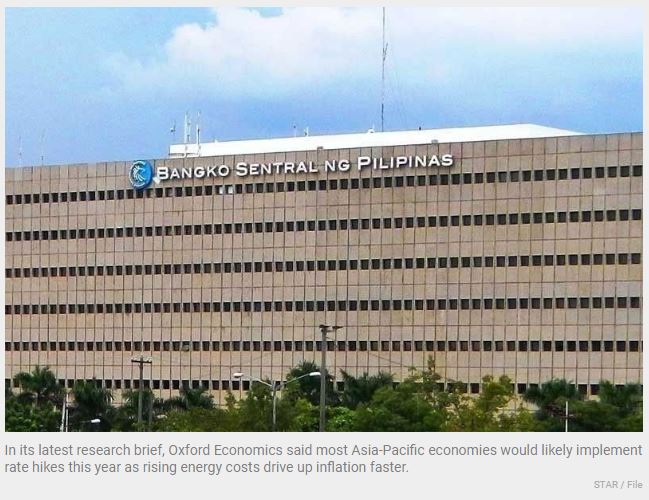Philippines: BSP under growing pressure to hike rates
MANILA, Philippines — Pressure is mounting for the Bangko Sentral ng Pilipinas (BSP) to raise key interest rates as an escalation in inflation looms following Russia’s military attacks on Ukraine, a global think tank said.
In its latest research brief, Oxford Economics said most Asia-Pacific economies would likely implement rate hikes this year as rising energy costs drive up inflation faster.
Oxford lead economist for Asia Sian Fenner forecasts an average 55-basis-point rate increase this year alone for Asia-Pacific.
Despite this, most monetary policies in the region would remain supportive of growth, she said.
Fenner said the transition to policy normalization would begin in the second quarter, starting off with Indonesia set to raise rates by a total of 75 bps.
“That said, in the current risk-off environment, there is a risk that Indonesia and other twin deficit countries – India and the Philippines – will be under pressure to raise rates more aggressively,” she said.
The so-called “twin deficit” is already threatening the pace of recovery in the Philippines.
A twin or double deficit happens when a country has both a current account deficit and budget deficit, which means that imports are higher than exports and that the government is spending more money than what it is earning.
“We expect Malaysia and the Philippines to raise rates twice this year by 50 bps from the third quarter,” Fenner said.
During its policy meeting two weeks ago, the BSP left its key rate unchanged at a record low of two percent.
However, the central bank has signaled it would “continue to carefully develop its plans for the eventual normalization of its extraordinary liquidity measures when the conditions warrant.”
Fenner argued that global monetary policy conditions are becoming less accommodative as central banks are increasingly concerned that elevated inflation may turn out to be more permanent.
Inflation concerns are being exacerbated by rising oil prices that are expected to hover above the $100 per barrel level until the second half of the year as the war between Russia and Ukraine worsens.
“Asia Pacific is unlikely to be untouched by the Russia-Ukraine crisis. Higher inflation will squeeze household incomes while foreign demand is likely to be lower,” Fenner said.
The BSP expects full-year inflation to hit 3.7 percent, slightly above Oxford’s average inflation forecast for the region at 3.5 percent, on higher oil and food prices.
“As economies shift to living with COVID-19, we expect some broadening of demand inflation pressures,” Fenner said.
Still, inflation in Asia Pacific will still be under less pressure than those in the US, Europe and other emerging market regions.
Further, Fenner emphasized that central banks in Asia Pacific need to strike a balance between ensuring price stability and reviving their economies that have been hit hard by the pandemic.
Nonetheless, she noted that the Philippines and most countries in the region would catch up in terms of growth this year on the back of higher vaccination rates and stronger domestic demand.
“The gradual reopening of borders should also boost growth, particularly among the more tourism dependent economies. We expect the improvement in macro fundamentals to encourage central banks to lift policy rates from record lows,” Fenner said.
“But with large negative output gaps, especially in emerging Asia, we expect most will want to retain a growth-supportive stance,” she said.
Source: https://www.philstar.com/business/2022/02/28/2163777/bsp-under-growing-pressure-hike-rates


 Thailand
Thailand




